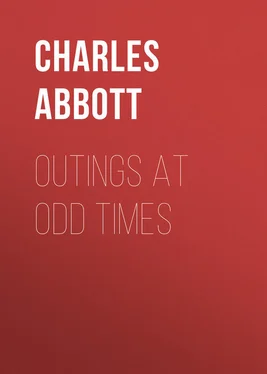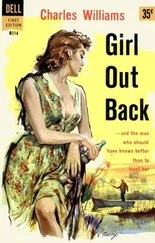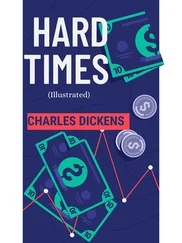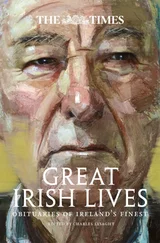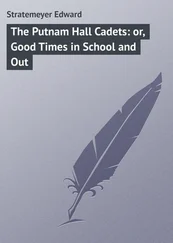Charles Abbott - Outings At Odd Times
Здесь есть возможность читать онлайн «Charles Abbott - Outings At Odd Times» — ознакомительный отрывок электронной книги совершенно бесплатно, а после прочтения отрывка купить полную версию. В некоторых случаях можно слушать аудио, скачать через торрент в формате fb2 и присутствует краткое содержание. Жанр: foreign_antique, foreign_prose, на английском языке. Описание произведения, (предисловие) а так же отзывы посетителей доступны на портале библиотеки ЛибКат.
- Название:Outings At Odd Times
- Автор:
- Жанр:
- Год:неизвестен
- ISBN:нет данных
- Рейтинг книги:5 / 5. Голосов: 1
-
Избранное:Добавить в избранное
- Отзывы:
-
Ваша оценка:
- 100
- 1
- 2
- 3
- 4
- 5
Outings At Odd Times: краткое содержание, описание и аннотация
Предлагаем к чтению аннотацию, описание, краткое содержание или предисловие (зависит от того, что написал сам автор книги «Outings At Odd Times»). Если вы не нашли необходимую информацию о книге — напишите в комментариях, мы постараемся отыскать её.
Outings At Odd Times — читать онлайн ознакомительный отрывок
Ниже представлен текст книги, разбитый по страницам. Система сохранения места последней прочитанной страницы, позволяет с удобством читать онлайн бесплатно книгу «Outings At Odd Times», без необходимости каждый раз заново искать на чём Вы остановились. Поставьте закладку, и сможете в любой момент перейти на страницу, на которой закончили чтение.
Интервал:
Закладка:
“Truly,” remarked neighbor A to neighbor B, “we did not expect to meet thee here. We’ve been intending to drive over for some time, but the work at home prevented.”
“And that is what I was about to remark; the same impulse has moved us both.” A certain small boy smiled.
“This is quite a Christmas celebration,” the somewhat bewildered host replied, and no sooner had the sound of his voice died away than neighbor C was announced; and neighbors D and E followed in his wake. I lingered to hear the result, but did not dare show myself. My face was very red, for poor sedate grandfather was stuttering! “Really, truly; this is, treally, ruly” – I heard no more, but made a dash for the back yard. Unlucky dash! I collided with my portly aunt, and both sprawled upon the entry floor. The company came streaming from the parlor, but what came of it I never learned. I was up and away before the mystery was solved. A rest on the far side of the barn finally restored me. Joy and fear made it a merry and mad Christmas both, but the point was gained. The monotony of winter farm-life was broken – very much broken, in fact – for now the tables were turned, and voices were calling for me, some in persuasive, some in authoritative, tones. At last I responded; and oh! what relief, when the one thing needed was to run down chickens. “How many?” I quietly asked, “a dozen?” It was an unfortunate question. A glitter, full of meaning, flashed in the eyes of my portly aunt. She held me responsible for the day’s excitement and extra labor, and I knew it; but I grinned whenever I caught glimpses of the gathered neighbors, who could not cease to wonder over the strange coincidence.
Dinner was served in due time. It took two tables to seat the guests, and the old kitchen was full for once. All went well until the portly lady, who still smarted from her fall, asked of me “what all this meant?”
“What does what mean?” I asked in reply.
“That all these friends should happen here to-day?”
“How should I know?” I asked.
“Thee does know all about it,” the old lady insisted, and so a confession was forced. What else could I do? Twenty curious faces were centered upon me, and the truth came out.
“Never mind, never mind!” chimed in my good grandfather, at the proper moment. “I was sure a committee was about to take me to task for some offense, and as I have come off so well, so shall he.”
“That boy will make something some of these days,” remarked one long-headed man; but, alas! his usual good judgment failed for once. That boy, so far as he is aware, has not made much since then – much worth the making; but has, no end of blunders.
Who cares? It was my first jolly Christmas and a complete success; and would that the same season could once again be jolly!
A New Place to Loaf
One must plow deeply nowadays to unearth novelty. The world has been written up, and that which we now read is but the echo of some well-nigh forgotten author. Many will be quick to question this, and battle for their originality, but a few days of honest search on their part among really old books will bring them to confusion. It is with living writers as with the “oldest inhabitants” who declare they never knew such weather – they had better not face statistics. Blooming orchards in January are on record, and February roses gladdened our great-grandmothers.
“Is there nothing more to be said?” I had been asking of myself as I daily tramped about the farm, or, on rainy days, ruminated in the attic in a forest of discarded furniture. The outlook, for a while, was certainly discouraging, and then suddenly the hay-mow came to mind. As a boy, I loved the hay-mow; how is it now, in my maturer years?
Spurred by the impulse of so bright a thought, I went to the stable, and with old-timed suppleness clomb the straight ladder. What memories of summer days in the meadows rushed in with the odor of the heaped-up hay! A fancy, perhaps; but even the sweet-scented vernal grass that yearly adds its charm to a single corner of one field seemed stored in the dark loft. It matters not; that corner, with its wealth of bright blossoms, the glittering sunshine of May’s perfect mornings, the song of nesting thrushes, and the rose-throated grosbeak’s matchless song, were plainly seen and heard. It mattered not that it was January instead of June, and the shrill north wind whispered its well-nigh forgotten warnings – summer reigned in the hay-mow. The noontide glare that webbed the dark with trembling threads of light aided my fancy, and I reveled in day-dreams.
That was a painful pleasure when the past was measured, and forty years marked off the distance between my first visit and the present. Would life have appeared as rosy-hued could I have looked as far forward as unto to-day? Perhaps not. And what of the retrospective glances that dimly discern the timid child floundering then in the half-filled mow? With what wonder were the darting swallows marked as they sped to their nests upon the rafters, and then fled through a gaping chink to the outer world! What mystery shrouded the hastening mice that ran across the mow’s wide window-sill, squeaked as they met, and hurried on their way! Why would they not stop and speak to the little child? Even then, birds and mice gave rise to strange and painful thoughts, for why, indeed, should they fear the child that longed to be their playmate? That fancy has not fled unto this day. I love them now as then, and, no longer wondering why they fear man, regret the fact almost as keenly as in days gone by.
And later, when a sturdy lad – but lazy – what a favorite hiding-place when there were distasteful tasks to be shirked! The rattle of a loose shingle to-day became the familiar calling of my name when errands were to be run, when the hated churn was ready, wood to be cut or burdens to be carried. But, like all else that this world offers, the hay-mow was not perfection. I paid dearly for my thoughtlessness more than once. There was much evidence of a busy day about the house, some thirty years ago, and at breakfast I imagined that I would be in demand; but to even think of work upon such a perfect day for idling was painful, and, as usual, I soon disappeared. But nature was perverse. Not a familiar nook about the farm responded as it usually did. Even the trees were so wrapped in their own affairs as to turn the cold shoulder. Everything went wrong, and hours before noon I longed to be called. I listened for some familiar voice or the regulation toot-toot of the dinner-horn. The old roosters about the barn crowed in a bantering way, as if calling me the foolish boy that I was. It was irritating beyond endurance, and so, with the usual unreason of piqued youth, I crept into the hay-mow, and, while smarting from self-inflicted pain, fell asleep. Hours passed, and then, starting from a nightmare dream, I went sullenly to the house. Every one smiled as I entered. What was the matter? Every one was silent, but the secret could not be kept. A picnic party had called for me. “It is so seldom thee hears me,” remarked my aunt, “that I did not think it worth my while to call thee to-day,” and then every one smiled exasperatingly. No dinner, no picnic, no appetite for supper; but my eyes were opened.
It is the same hay-mow as forty years ago, when first I saw it; the same as eighty years ago, when my father watched it building, and made it his playground, if not a lazy lad’s refuge. Here is the same loose floor that needs a thick mat of hay to render it safe to walk over, and, in one sense, the same dusty festoons of cobwebs clinging to every corner; while the roof, as of old, is starred with mud-wasps’ nests and dotted with the swallows’ masonry. My father’s playground! Did he, too, I wondered, often linger here, thinking much the same thoughts and planning his life’s battles while idly resting on the hay? It is not upon record, nor need be, but the old hay-mow bears testimony to his one-time presence here. Flinging open the heavy shutter of the south window, I glanced at the shining oaken sill and frame. Both were covered with rudely carved letters, initials of many a lad long since grown to manhood, and not one of them now living. How closely I was linked to a long-gone past! In the bright sunshine of this January day there was no trace of winter in the landscape. From my outlook I saw nothing of the familiar fields and distant river so dear to my own boyhood, but that wilder valley and more rugged fields that were the pet theme of my father’s stories when he charmed his hearers telling of his youth. How tame is the present when compared with what has been! What though the world has wonderfully advanced, there is not for me, for one – and I voice many another – aught in the present, or aught that imagination conjures up as the possible future, that can charm as does the sweet calling back of days gone by.
Читать дальшеИнтервал:
Закладка:
Похожие книги на «Outings At Odd Times»
Представляем Вашему вниманию похожие книги на «Outings At Odd Times» списком для выбора. Мы отобрали схожую по названию и смыслу литературу в надежде предоставить читателям больше вариантов отыскать новые, интересные, ещё непрочитанные произведения.
Обсуждение, отзывы о книге «Outings At Odd Times» и просто собственные мнения читателей. Оставьте ваши комментарии, напишите, что Вы думаете о произведении, его смысле или главных героях. Укажите что конкретно понравилось, а что нет, и почему Вы так считаете.
